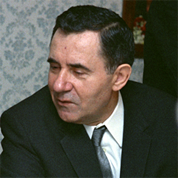Commemoration of the centenary anniversary of the legendary diplomat ‘Mister No’

Russia as a whole, and the diplomatic communities in particular, celebrated in July the centenary birthday of the famous diplomat, ex-Soviet Foreign Affairs Minister Andrei Gromyko, who was more popularly known in the Western diplomatic circles as the “Mr. No.” This and other nicknames, including ‘Comrade Grom,’ were given by both friends and foes to the legendary negotiator, who ran the Soviet Foreign Ministry for record 28 years that stretched across five USSR general secretaries and eight U.S. presidents, for his unprecedented skills to cannily defend, without compromises, the Soviet positions on all key geopolitical matters that came up for negotiations with Western countries, the so-called ideological opponents of the Soviet Union at that time.
Specifically, Gromyko took part in all international meetings, including the Yalta and Potsdam conferences, which laid the foundation for the political structure of the post-WWII era. Indded, it was his signature that is on the charter of the formation of the UN, and it was upon his proposal that the right of veto was introduced for permanent members of the Security Council, a tool which was repeatedly used by him, as a permanent representative of the USSR at UN, in what he frequently referred as a measure “of forcing partners towards negotiations.’
In addition, he took active parts in other international issue and other geopolitical developments that shaped global policies for decades, such as the signing of the agreement on modern global security, the agreement on non-proliferation of nuclear weapons and restriction on deployment of strategic armaments, and finally the Conclusive Helsinki Act of 1975, which fixed post-WWII boundaries of European countries till the collapse of the Soviet bloc.












 Web design,
Web design,